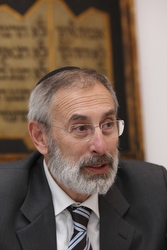In a week of widespread enthusiasm for the election of Pope Francis, there have been two positive developments regarding the Catholic Church and its relations with both the Orthodox and the Jews.
 |
| Ecumenical Patriarch Bartholomew of Constantinople will attend Pope Francis' inaugural Mass CNS photo |
The Orthodox Church
The first is that the Ecumenical Patriarch Bartholomew of Constantinople will attend Pope Francis' inaugural Mass on Tuesday, March 19.According to the Ecumenical Patriarchate Press Office, this will the first such visit since the definitive Orthodox-Catholic rupture in 1054.
Bartholomew will be accompanied by the co-president of the Joint International Commission for Theological Dialogue between the Roman Catholic and the Orthodox Church, as well as the Orthodox Metropolitans of Argentina and Italy.
While Pope Francis has not been involved in the Catholic-Orthodox dialogue efforts, he himself has served as the bishop for the Eastern-Rite faithful in Argentina.
Upon news of the election of Pope Francis, the Ecumenical Patriarch had sent a particularly warm note of congratulations. "Permit us also, on this historic occasion, to convey our unfeigned wishes and fervent prayers that your papal tenure may prove to be a source of peace in our world of turmoil and division, a refuge and consolation for our Lord's poor and suffering brothers and sisters, as well as a continuation of our journey toward reconciliation and consolidation of the dialogue toward unity as Sister Churches," the Patriarch's message had read.
The Russian Orthodox Church
The Russian Orthodox Church, which has often been a bit more distant from the Roman Catholic Church than Bartholomew, also reacted positively to the election of Pope Francis.The head of the Moscow Patriarchate's Department for External Church Relations, Archpriest Dimitry Sizonenko, said that the new pope "is known for his conservative positions and his reign will be characterized by the strengthening of faith."
"The fact that he took the name Francis confirms his conception of evangelization primarily as a service to the poor, such as protection of their dignity," Sizonenko said.
The Russian Orthodox spokesman said he hopes that the policies of Pope Benedict XVI will continue, as will positive developments in ecumenical dialogue.
Sizonenko called Pope Francis' request that the people pray for and bless him an act of "great charisma and humility."
Judaism
In a separate development, the pope on Friday, March 15, sent a note to Riccardo di Segni, the Chief Rabbi of Rome, inviting him specifically to the inauguration Mass on March 19. Pope Francis also expressed the wish that he will be able to "contribute to the progress of relations between Jews and Catholics" that began with the second Vatican Council "in a spirit of renewed collaboration and in service to a world that can always be more in harmony with the will of the Creator." |
| Riccardo di Segni, Chief Rabbi of Rome, pictured in office CNS photo |
As archbishop of Buenos Aires, Bergoglio attended Rosh Hashanah services at the Benei Tikva Slijot synagogue in September 2007, and last year he hosted a Kristallnacht memorial event at the Buenos Aires Metropolitan Cathedral with Rabbi Alejandro Avruj from the NCI-Emanuel World Masorti congregation.
Perhaps one of the most dramatic attacks on the Argentine Jewish community happened when a Jewish community center was bombed by radicals in 1994 in Buenos Aires, killing 85 people. After the bombing, said Rabbi David Rosen, the director of interfaith affairs for the American Jewish Committee, Bergoglio "showed solidarity with the Jewish community" and has continued to call for justice for the victims.
"Those who said Benedict was the last pope who would be a pope that lived through the Shoah, or that said there would not be another pope who had a personal connection to the Jewish people, they were wrong," Rosen told the Jewish news service JTA (Jewish Telegraphic Agency).
Greg Erlandson is OSV president and publisher.